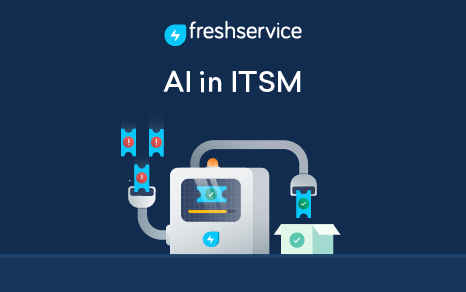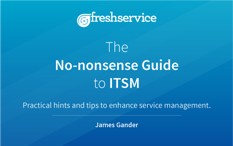AI & End User
In the digital age, technology is essential for almost any job. If your employees can’t use the software and devices they need to do their jobs, it affects their productivity and their satisfaction with IT. AI helps improve their tech support experience by providing:
Personalized conversations
Chatbots and virtual agents ensure real-time, consistent, and personalized interactions with end users. For Tier I queries, AI can help them quickly find their own answers and solve their own problems 24/7 from any location. It does this by searching the knowledge base for solutions. If not available, it can suggest solutions from the cloud and create new articles that can be stored in the repository.
If users need help solving complex Tier II and Tier III queries, intelligent routing can ensure they reach the right agent the first time. This eliminates frustration and shortens wait times, which improves customer satisfaction.
Classification of incident vs service request
End users often get confused about the difference between an incident and a service request. Incorrectly tagging a ticket creates more work for IT agents, which means a longer time to resolution for the user. AI technology identifies the ticket type based on its past learnings and classifies it for the service desk agents, helping users get results faster.
Service item auto-approval
When end users place any service request, ML checks for the service item availability and approve automatically without any human intervention. Approval is handled based on the priority, past history, and impact of the requested item. This way, users get what they need quickly, without having to jump through hoops or wait for a human agent to help.
AI & Management
IT managers and decision-makers also get a helping hand from AI in ITSM, which helps guide process improvements and streamline workflows via:
Workflow optimization and automation
Good managers anticipate problems, identify common issues, and provide their teams with the information they need to solve them efficiently and effectively. AI can help them do this.
For example, AI-enabled ITSM solutions automatically identify common types of tickets that tech teams receive. Then it analyzes how these problems have been best solved in the past to create resolution workflows for agents to follow. It also determines which problems can be solved by bots and deploys automated workflows across channels whenever possible.
Root cause analysis
AI doesn’t just help management determine how to solve common problems. It can also help them determine the root cause of these problems so they can take corrective action to avoid them in the future.
Strategic decision making
Predictive analytics tools analyze past results and forecast future projections for revenue, customer satisfaction, and resource planning. This helps management make informed decisions about budgeting, hiring, and expense management. It also provides insights on agent and service desk performance, which they can use to continually improve operations and customer service.
Predict SLA/contract violations
ML analyzes previous trends to identify any future SLA violations and notify management before they happen. This is done depending on the ticket volume, seasonal workload, infrastructure failure, and resource issues. This way, contractual agreement is maintained and customer issues are resolved on time.
Support agile development
AI can transform app development and IT infrastructures by shortening the life cycle of software development and integrating that software into the tech stack. It can also help managers prioritize and manage development projects based on business goals and available resources.
The Power of AI-First Experiences
If there’s a problem that can be solved 100% by an AI experience, that means your cost to serve customers can be significantly lowered (as an AI-powered experience).
The market is currently flooded with AI-powered summarization and auto-complete tools. Mirchandani points out, though, that “AI-first experiences” take AI-based solutions to an entirely different, more sophisticated level. With AI-first experiences, complex decision-making, and rapid execution become embedded in the very systems involved in running the business.
“You can execute analyses, builds, and deployments (that typically take days or weeks) in a matter of minutes,” Mirchandani explains. This can be transformative for your IT service operations with a significant impact on efficiency, costs, and customer experience.
“For example, imagine your AI analyzing the most common types of IT tickets logged, organizing the data for you, identifying the most common types of tickets, and automating the resolution using a bot flow. Now, take that one step further, and imagine the AI then deploying the bot flow across the company’s messaging channels.”
Or look at cases where you experience a surge in tickets yet require fast response times. For example, when extreme weather conditions cause mass flight cancellations, airlines receive thousands of customer service calls to rebook passengers.
Mirchandani expounds, “AI enables you to see the influx of tickets in real-time, construct a bot flow, and automatically rebook customers on future flights. This would take humans hours to build and deploy; AI can do so in minutes.” This is just one of the various possibilities for deploying the technology to improve operational performance and better satisfy customers.




